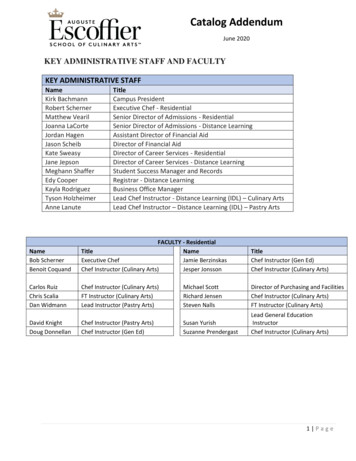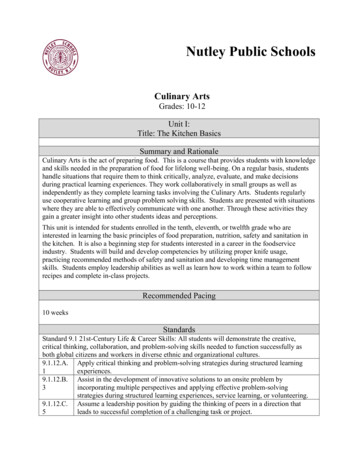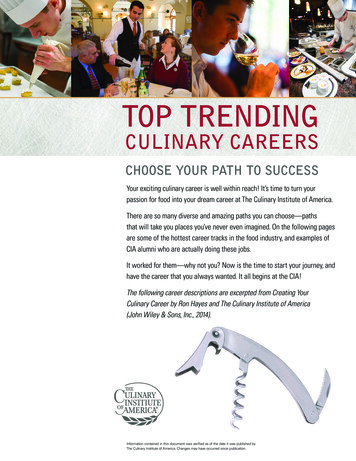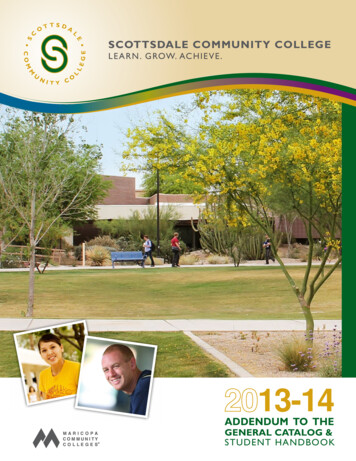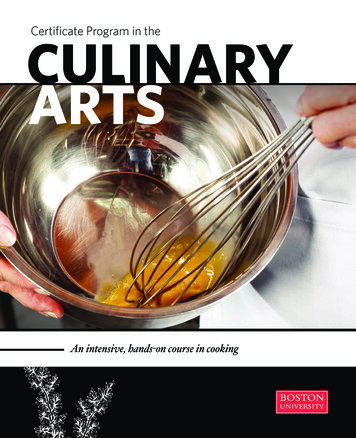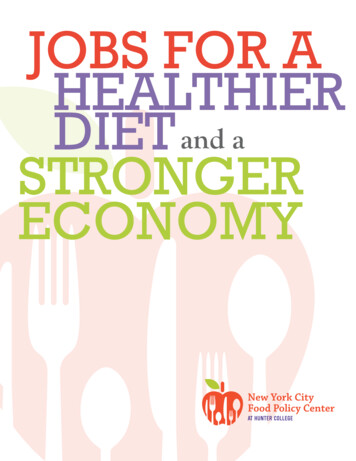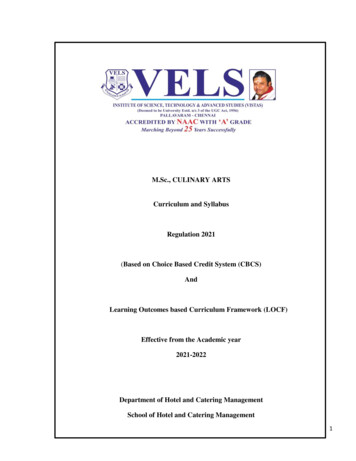
Transcription
M.Sc., CULINARY ARTSCurriculum and SyllabusRegulation 2021(Based on Choice Based Credit System (CBCS)AndLearning Outcomes based Curriculum Framework (LOCF)Effective from the Academic year2021-2022Department of Hotel and Catering ManagementSchool of Hotel and Catering Management1
SEMESTER SYSTEMRegulation and Syllabus (Effective from the Academic Year 2021-2022)M.Sc., Culinary artsPROGRAM EDUCATIONAL OBJECTIVES (PEO)PEO1:The M.Sc. culinary arts is a special advanced program that is designed for the student tounderstand the basics of culinary practices & to enable him/her to develop the minimum skilllevels required to proceed further into the journey of discovering the finer nuances ofcuisines.PEO2: A complete understanding about various aspects such as hygiene, safety, grooming etc. willprepare the student for professional life.PEO3: The student will be able to understand the global food service industry and the current trendsof ever progressing cuisines. This will also emphasize and equip them with concept planning,menu planning after having gone through the basic and advanced cooking techniques. Thestudents will also be given an exposure to most demanding breakfast cooking andinternational cuisines. This will be followed by practical experience of food pickupexperience in a coffee shop kitchenPEO4: The student will be provided with the knowledge of the fundamental principles of culinarypractices that enable a graduate to become a professional chef.PROGRAM OUTCOME (PO)Upon successful completion of the module, students will be able to:PO1: Explain the evolution and growth of culinary practices & explore intensively the history andculinary traditions of the world.PO2: Determine the underlying techniques involved in the preparation of dishes.PO3: Develop proficiency in classic and contemporary culinary techniques and cooking methods inà la carte, table d'hôte, and banquet food menus.PO4: Practice professional ethics, provide leadership, demonstrate personal and globalresponsibility, and work effectively as a team member.PO5: Apply skills in the usage of equipment in a state of the art Kitchen.2
PO6: Prepare and execute basic western, Asian and Indian menus using the various inputs oflearning and cuisine techniques.PO7: Demonstrate basic culinary skills and rudiments of food safety, cost control and nutrition.PROGRAMME SPECIFIC OUTCOME (PSO)PSO1: Develop young men and women into highly adept professional chefs.PSO2: Apply the concepts and skills necessary to achieve guest satisfaction.PSO3: Conduct him/her in a professional and ethical manner, and practice industry-defined workethics.PSO4: Use knowledge of best practices to further aid sustainability (economic, environmental, andcultural/social) in the industry.3
BOARD OF STUDIES MEMBERSChairmanMr. Mark Keith FaradayHOD, School of Hotel & Catering Management,VISTAS,Pallavaram,Chennai - 600 117.External Members:Mr. P.K. SajithFood & Beverage Manager,Residency Towers Chennai,15, Sir Theagaraya Rd,Parthasarathi Puram, T. Nagar,Chennai, Tamil Nadu 600017Industry expertLogesh.NAcademic expertAssistant Professor and H.O.DDepartment of Hotel & Catering MgmtMohamed Sathak College of arts and sciencSholinganallur Main Road,Medavakkam,Chennai, Tamil Nadu 600100Internal Members:1. Mr. Arun .AAsst. Professor,School of Hotel & Catering Management,VISTAS,Pallavaram, Chennai - 600 117.2. Mr. A.Wilfred Lawrence,Asst. Professor,School of Hotel & Catering Management,VISTAS,Pallavaram, Chennai - 600 117.3. Mr. Srikumar, (M.Phil. Student)AlumnusSchool of Hotel & Catering Management,VISTAS,Pallavaram, Chennai - 600 117.4
I. TITLE OF THE PROGRAMMEThis Master‟s degree shall be called Master of Science in Culinary ArtsII. COURSE DURATIONThe M.Sc. Culinary arts course of the School of Hotel and Catering Management, VELS Institute ofScience Technology & Advanced Studies, shall be spread over two year duration with foursemesters. Each semester shall comprise of a minimum of 18 instructional weeks of 5 days each 6hours a day (Total contact hours 360). Continuous Internal evaluation referred to as CA (Continuousassessment) during the course period and university examination at the end of the each semestershall be conducted.III. MEDIUM OF INSTRUCTIONThe medium of instruction and examinations shall be EnglishIV. ELIGIBILITY FOR ADMISSION1. B.Sc. Hotel & Catering Management, B.Sc., Food, Nutrition & Dietetics, B.Sc., Home science.V. ADMISSION PROCEDURE:An admission Committee is constituted at the department level for administering the admission forM.Sc. Culinary arts every year subject to the approval of honorable Vice -Chancellor.The entire admission process will be monitored by the committee. The admission shall be based onthe following two components.a. Qualifying examination at UG level – 50% of total marks.b. Interview5
VILIST OF COURSES FOR M.Sc. CULINARY ARTS PROGRAMMEM.Sc., IN CULINARY ARTS CURRICULUMTotal No. of Credits: 90SEMESTER – ICategoryCodeTitle of the CourseLecture21CMIA11 Art, food and culture- the gastronomyCore3Effective and efficient food and21DMIA11 beverageDSEoperationandcost2managementAdvance Indian food skill development21CMIA12Core3and global trend21CMIA13 Presentation and visual effect on foodCore3Art of bakery and contemporary bread21CMIA14Core3making:Advance Indian food skill development21PMIA11Coreand global trend - LabArt of bakery and contemporary bread21PMIA12Coremaking: LabSUB TOTAL14SEMESTER – IIPrinciplesofmanagement21DMIA21 y, food service concept and21DMIA22DSE2environmental concernCreative Western Cuisine and21CMIA21Core3Building Gastronomical knowledge.Advance Dessert Preparation and21CMIA22 Plating, Preparation of InternationalCore3BreadsSafety, fssai, sanitation and hygiene21DMIA23DSE2management21CMIA23 Art of garde mangerCore2Creative Western Cuisine and21PMIA21 Building Gastronomical knowledge.CoreLabAdvance Dessert Preparation and21PMIA22 Plating, Preparation of InternationalCoreBreads – Lab21PMIA23 Art of garde manger – LabCoreSUB TOTAL14HOURS / WEEKTutorial PracticalCredits323336363122022332263633215226
M.Sc., IN CULINARY ARTS CURRICULUMSEMESTER – ore21CMIA32CoreDSECoreTitle of the CourseNutrition and WellnessMenu planning, product developmentand sustainabilityHoning the art of Asian cookingMastering the art of Food andBeverage ServiceAdvanced dessert preparation and21CMIA33plating, International breads21PMIA34 Menu planning, product developmentand sustainability- LabHoning the art of Asian cooking - LabHOURS / WEEKLecture21PMIA32Core21PMIA33222222222Mastering the art of Food andBeverage Service – LabAdvanced dessert preparation andplating, International breads - LabSUB TOTALCredits221PMIA31CoreTutorial Practical10326332631820SEMESTER – IVSEC21IMIA41Industrial Exposure Training18DSE21RMIA41Project plus Viva Voce10SUB TOTAL28Credit Assignment Each course is assigned certain number of credits based on the following:Contact period per week CREDITS1 Lecture Period-1 Credit1 Tutorial Period-1 Credit2 Practical Periods-1 Credit(Laboratory / Seminar / Project Work / etc.)7
VII COURSE CALENDARDate of commencement of course will be done by the university. The course calendar published bythe university shall be followed for ensuring timely conduct of the course, examination andpublication of results.VII SCHEME OF THE COURSEM.Sc. Culinary Arts will have 4 semesters. Each Course carries 100 marks (Internal 40 and external60) excepting for Project Report. An internal viva voce examination will be conducted at the end ofthe 4th semester.IX SCHEME OF EXAMINATION AND RESULTSAssessment of students for each course will be done by continuous evaluation both internal andexternal. Internal evaluation shall be conducted by the faculty handling the course. End semesterexaminations of all subjects will be conducted by the university.The split up of the Continuous Assessment Marks for theory are as followsCA Class testsClass AssignmentModel ExaminationAttendanceAptitude of the studentFaculty assessment (by teacher)Total3X5 151X5 051X5 051X5 051X5 051X5 0540The split up of the Continuous Assessment Marks for Practical are as followsRecord workClass AssignmentModel PracticalAttendanceAptitude of the studentFaculty assessment (by teacher)Total1X10 101X5 051X10 101X5 051X5 051X5 0540X REQUIREMENTS FOR PROCEEDING TO SUBSEQUENT SEMESTERa) Eligibility: Students shall be eligible to go to subsequent semester only if they earn sufficientattendance as prescribed therefore by the Board of Management from time to time.8
b) Attendance: All Students must earn 75% and above of attendance for appearing for theUniversity Examination. (Theory/Practical)c) Condonation of shortage of attendance: If a Student fails to earn the minimum attendance(Percentage stipulated), the HODs shall condone the shortage of attendance up to a maximumlimit of 10% (i.e. between 65% and above and less than 75%) after collecting the prescribedfee towards the condonation of shortage of attendance. Such fees collected and should beremitted to the University.d) Non-eligibility for condonation of shortage of attendance: Students who have secured lessthan 65 % but more than 50 %of attendance are NOT ELIGIBLE for condonation of shortageof attendance and such Students will not be permitted to appear for the regular examination,but will be allowed to proceed to the next year/next semester of the programe) Detained students for want of attendance: Students who have earned less than 50% ofattendance shall be permitted to proceed to the next semester and to complete the Program ofstudy. Such Students shall have to repeat the semester, which they have missed by re-joiningafter completion of final semester of the course, by paying the fee for the break of study asprescribed by the University from time to time.f) Condonation of shortage of attendance for married women students: In respect of marriedwomen students undergoing UG programs, the minimum attendance for condonation(Theory/Practical) shall be relaxed and prescribed as 55% instead of 65% if they conceiveduring their academic career. Medical certificate from the Doctor together with theattendance details shall be forwarded to the university to consider the condonation ofattendance mentioning the category.g) Zero Percent (0%) Attendance: The Students, who have earned 0% of attendance, have torepeat the program (by re-joining) without proceeding to succeeding semester and they haveto obtain prior permission from the University immediately to rejoin the program.h) Transfer of Students and Credits: The strength of the credits system is that it permits interInstitutional transfer of students. By providing mobility, it enables individual students todevelop their capabilities fully by permitting them to move from one Institution to another inaccordance with their aptitude and abilities.i) Transfer of Students is permitted from one Institution to another Institution for the sameprogram with same nomenclature. Provided, there is a vacancy in the respective program ofStudy in the Institution where the transfer is requested. Provided the Student should havepassed all the courses in the Institution from where the transfer is requested.ii) The marks obtained in the courses will be converted and grades will be assigned as per theUniversity norms.iii) The transfer students are not eligible for classification.iv) The transfer students are not eligible for Ranking, Prizes and Medals.v) Students who want to go to foreign Universities up to two semesters or Project Work with theprior approval of the Departmental/College Committee are allowed to get transfer of creditsand marks which will be converted into Grades as per the University norms and are eligibleto get CGPA and Classification; they are not eligible for Ranking, Prizes and Medals9
XI EXAMINATION AND EVALUATIONa) Register for all subjects: Students shall be permitted to proceed from the First Semester up toFinal Semester irrespective of their failure in any of the Semester Examination. For thispurpose, Students shall register for all the arrear subjects of earlier semesters along with thecurrent (subsequent) Semester Subjects.b) There shall be no passing minimum for Internal.c) For external examination, passing minimum shall be 50% [Fifty Percentage] of the maximummarks prescribed for the paper for each Paper/Practical/Project and Viva-Voce.d) In the aggregate [External/Internal] the passing minimum shall be of 50%.e) He /She shall be declared to have passed the whole examination, if he/she passes in all thepapers and practical wherever prescribed as per the scheme of the examinations by earning90 CREDITS.XII MAXIMUM PERIOD FOR COMPLETION OF THE PROGRAMS TO QUALIFY FORA DEGREE7.1.A Student who for whatever reasons is not able to complete the programs within the normalperiod (N) or the Minimum duration prescribed for the program, may be allowed two years periodbeyond the normal period to clear the backlog to be qualified for the degree. (Time Span N 2years for the completion of program)XIII REVISION OF REGULATIONS, CURRICULUM AND SYLLABIThe University may from time to time revise, amend or change the Regulations, Curriculum,Syllabus and Scheme of examinations through the Academic Council with the approval of the Boardof Management.XIV Pattern of Question Paper10 out of 10 questionsPart – A (30 words)10 X 3 marks 30 marks5 out of 8 questionsPart – B (200 words)5x 8 marks 40 marks2 out of 4 questionsPart – C (500 words)2x 15 marks 30 marksTotal100 marks10
Learning Outcomes based Curriculum Framework(LOCF)forPostgraduate ProgrammeM.Sc. Culinary Arts, 2021Table of Contents1. Introduction to M.Sc. Culinary Arts2. Learning Outcome-based Approach to Curriculum Planning in M.Sc. Culinary Arts2.1.Nature and Extent of the M.Sc. Programme in Culinary Arts2.2 Aims of Master‟s Degree Programme in Culinary Arts3. Postgraduate Attributes in Culinary Arts4. Qualification Descriptors for M.Sc. in Culinary Arts5. Programme Learning Outcomes for M.Sc. in Culinary Arts6. Structure of courses in M.Sc. Culinary Arts6.1. Credit Distribution for M.Sc. Course in Culinary Arts6.2. List of course distribution for PG Programme in Culinary Arts6.5. Course-level Learning Outcomes6.6.Details of contents for M.Sc. Culinary arts with the suggested reference books.7. Teaching-Learning Process8. Assessment and evaluation methods11
1. Introduction to M.Sc. Culinary ArtsThis module is designed for the student to understand the basics of culinary practices & toenable him/her to develop the minimum skill levels required to proceed further into the journeyof discovering the finer nuances of cuisine.The student will take his/her own understanding of the subject & apply it in a realistic mannerto achieve certain benchmarks & quality parameters.A complete understanding about various aspects such as hygiene, safety, grooming etc willprepare the student for professional life.The student will be able to understand the global food service industry and the current trends ofever progressing cuisines. This will also emphasize and equip them with concept planning,menu planning after having gone through the basic and advanced cooking techniques. Thestudents will also be given an exposure to most demanding breakfast cooking and internationalcuisines. This will be followed by practical experience of food pick up experience in a coffeeshop kitchenThe student will be provided with the knowledge of the fundamental principles of culinarypractices that enable a graduate to become a professional chef.2. Learning Outcome-based Approach to Curriculum Planning in Culinary ArtsThe fundamental premise underlying the learning outcomes-based approach to curriculumplanning is that higher education qualifications such as Master‟s Degree programme in culinaryarts is awarded on the basis of demonstrated achievement of outcomes (expressed in terms ofknowledge, understanding, skills, attitudes and values) and academic standards expected of thepostgraduates in Culinary Arts. The National Curriculum Framework for Postgraduate Studiesin Culinary Arts, therefore, is an outcome-based framework. Learning outcomes specify whatstudents completing a particular programme of study are expected to know and be able to do at theend of their programme of study. The learning outcomes indicate the knowledge, skills, attitudes andvalues that are required to enable the students to effectively participate in knowledge productionand in the knowledge economy, improve national competitiveness in a globalized world and forequipping young people with skills relevant for global and national labour markets and enhancingthe opportunities for social mobility.Nature and Extent of the M.Sc. Programme in Culinary Arts The National CurriculumFramework for Postgraduate Studies in Culinary Arts is an outcomes-based framework based onthe expected learning outcomes and academic standards that are expected to be demonstrated by apostgraduate degree holder in Culinary Arts The key outcomes that help curriculum planning atthe postgraduate level include Postgraduate Attributes, Qualification Descriptors, ProgrammeLearning Outcomes, and Course-level Learning Outcomes.12
Aims of Master’s Degree Programme in Culinary ArtsThe overall aims of the LOCF for Culinary Arts at PG level are to: help formulate postgraduate attributes, qualification descriptors, programme learning outcomesand course learning outcomes that are expected to be demonstrated by the holder of a Master‟sdegree; enable prospective students, parents, employers and others to understand the nature and level oflearning outcomes (knowledge, skills, attitudes and values) or attributes a graduate/postgraduateshould be capable of demonstrating on successful completion of M.Sc. Culinary Arts maintain national standards and international comparability of standards to ensure globalcompetitiveness, and to facilitate postgraduate mobility; and provide higher education institutions and their external examiners an important point ofreference for setting and assessing standards.3. Postgraduate Attributes in Culinary ArtsThe postgraduate attributes reflect the particular quality and feature or characteristics of anindividual, including the knowledge, skills, attitudes and values that are expected to be acquired by apostgraduate through studies at the higher education institution (HEI) such as a college or university.Such attributes include capabilities that help strengthen one‟s abilities for widening currentknowledge base and skills, gaining new knowledge and skills, undertaking future studies andperforming well in a chosen career and playing a constructive role as responsible citizen of thecountry. The Attributes define the characteristics of a student's university degree programme(s), anddescribe a set of characteristics/competencies that are designed to be transferable beyond theparticular disciplinary area and programme contexts in which they have been developed. Suchattributes are fostered through meaningful learning experiences made available through thecurriculum, the total college/university experiences and a process of critical and reflectivethinking.The learning outcomes-based curriculum framework is based on the premise that everystudent is unique. Each student has his/her own characteristics in terms of previous learninglevels and experiences, life experiences, learning styles and approaches to future career-relatedactions. The quality, depth and breadth of the learning experiences made available to thestudents while at the college/University help develop their characteristic attributes. Thepostgraduate attributes reflect both disciplinary knowledge and understanding andgeneric/global skills and competencies that all students in different academic fields of studyshould acquire/attain and demonstrate. Some of the desirable attributes which a postgraduatestudent should demonstrate will include the following:Disciplinary Knowledge: Demonstrate comprehensive knowledge and understanding of one ormore disciplines that form a part of a programme of study, and knowledge and skills acquired frominteraction with educators and peer group throughout the programme of study.Communication Skills: Express thoughts and ideas effectively in writing and orally,communicate with others using appropriate media, confidently share one‟s views and expressherself/himself, demonstrate the ability to listen carefully, read and write analytically, andpresent complex information in a clear and concise manner to different groups.13
Critical Thinking: Apply analytic thought to a body of knowledge, analyse and evaluateevidence, arguments, claims, beliefs on the basis of empirical evidence, identify relevantassumptions or implications, formulate coherent arguments, critically evaluate practices, policiesand theories by following scientific approach to knowledge development.Problem Solving: Demonstrate capacity to extrapolate from what one has learned and applytheir competencies to solve different kinds of non-familiar problems, rather than replicatecurriculum content knowledge and apply one‟s learning to real life situations.Analytical Reasoning: Demonstrate the ability to evaluate the reliability and relevance of evidence,identify logical flaws and holes in the arguments of others, analyse and synthesise data from avariety of sources, draw valid conclusions and support them with evidence and examples, andaddressing opposing viewpoints.Research-related Skills: Demonstrate a sense of inquiry and capability for askingrelevant/appropriate questions, problematising, synthesizing and articulating, demonstrate the abilityto recognize cause-and-effect relationships, define problems, formulate hypotheses, testhypotheses, analyse, interpret and draw conclusions from data, establish hypotheses, predictcause-and-effect relationships, plan, execute and report the results of an experiment orinvestigation.Collaboration/Cooperation/Team work: Demonstrate ability to work effectively andrespectfully with diverse teams, facilitate cooperative or coordinated effort on the part of a group,and act together as a group or a team in the interests of a common cause and work efficiently as amember of a team.Scientific Reasoning using Quantitative/Qualitative Data: Demonstrate the ability tounderstand cause-and-effect relationships, define problems, apply scientific principles, analyse,interpret and draw conclusions from quantitative/qualitative data, and critically evaluate ideas,evidence and experiences from an open-minded and reasoned perspective.Reflective Thinking: Demonstrate critical sensibility to lived experiences, with self-awarenessand reflexivity of both self and society.Information/Digital Literacy: Demonstrate capability to use ICT in a variety of learningsituations, demonstrate ability to access, evaluate, and use a variety of relevant information sourcesand to use appropriate software for analysis of data.Self-Directed Learning: Demonstrate ability to work independently, identify appropriate resourcesrequired for a project, and manage a project through to completion.Multicultural Competence: Demonstrate knowledge of the values and beliefs of multiple culturesand a global perspective, effectively engage in a multicultural society, and interact respectfullywith diverse groups.14
Moral and Ethical Awareness/Reasoning: Demonstrate the ability to embrace moral/ethicalvalues in conducting one‟s life, formulate a position/argument about an ethical issue frommultiple perspectives, and use ethical practices in all work. Demonstrate the ability to identifyethical issues related to one‟s work, avoid unethical behaviour such as fabrication, falsification ormisrepresentation of data or committing plagiarism, not adhering to intellectual property rights,appreciate environmental and sustainability issues, and adopt objective, unbiased and truthfulactions in all aspects of work.Community Engagement: Demonstrate responsible behaviour and ability to engage in theintellectual life of the educational institution, and participate in community and civic affairs.Leadership Readiness/Qualities: Demonstrate capability for mapping out where one needs togo to "win" as a team or an organization, and set direction, formulate an inspiring vision, build ateam who can help achieve the vision, motivate and inspire team members to engage with thatvision, and use management skills to guide people to the right destination, in a smooth andefficient way.Lifelong Learning: Demonstrate the ability to acquire knowledge and skills, including „learninghow to learn‟ that are necessary for participating in learning activities throughout life, through selfpaced and self-directed learning aimed at personal development, meeting economic, social andcultural objectives, and adapting to changing trades and demands of work place throughknowledge/skill development/reskilling.4. Qualification Descriptors in Culinary ArtsA qualification descriptor indicates the generic outcomes and attributes expected for the award of aparticular type of qualification (for example a master‟s degree). The qualification descriptorsalso describe the academic standard for a specific qualification in terms of the levels of knowledgeand understanding and the skills and competencies that the holders of the qualification areexpected to attain and demonstrate.Qualification descriptors include a statement of outcomes, the achievement of which astudent should be able to demonstrate at the end of the programme of study for the award of thequalification. These descriptors also indicate the national threshold academic standard for thequalification and help the degree-awarding bodies in designing, approving, assessing andreviewing academic programmes. The learning opportunities and assessment are expected to bedesigned to provide every student with the opportunity to achieve, and to demonstrateachievement of, the intended programme learning outcomes. The qualification descriptorsreflect both disciplinary knowledge and understanding and generic/global skills andcompetencies that all students in different academic fields of study should acquire/attain anddemonstrate. Some of the desirable outcomes which a postgraduate in Culinary Arts should be ableto demonstrate are as follows:Demonstrate (i) a systematic, extensive and coherent knowledge and understanding of anacademic field of study as a whole and its applications, and links to related disciplinaryareas/subjects of study, including a critical understanding of the established theories, principles andconcepts, and of a number of advanced and emerging issues/theories in the field of study; (ii)procedural knowledge that creates different types of professionals related to thedisciplinary/subject area of study, including research and development, teaching andgovernment and public service;15
(iii) Skills in areas related to one‟s specialization and current developments in the academic fieldof study, including a critical understanding of the latest developments in the area ofspecialization, and an ability to use established techniques of analysis and enquiry within thearea of specialization.Demonstrate comprehensive knowledge about materials and methods, including professionalliterature relating to essential and advanced learning areas pertaining to the chosen disciplinaryarea(s) and field of study, and techniques and skills required for identifying/solving problemsand issues relating to the disciplinary area and field of study.Demonstrate skills in identifying information needs, collection of relevant quantitative and/orqualitative data drawing on a wide range of sources, analysis and interpretation of data usingmethodologies as appropriate to the subject(s) for formulating evidence- based solutions andarguments.Use knowledge, understanding and skills for critical assessment of a wide range of ideas andcomplex problems and issues relating to the chosen field of study.Communicate the results of studies undertaken in an academic field accurately in a range ofdifferent contexts using the main concepts, constructs and techniques of the subject(s) of study.Address one‟s own learning needs relating to current and emerging areas of study, making useof research, development and professional materials as appropriate, including those related tonew frontiers of knowledge.Apply one‟s disciplinary knowledge and transferable skills to new/unfamiliar contexts and toidentify and analyse problems and issues and seek solutions to real-life problems.Demonstrate subject-related and transferable skills that are relevant to some of the job trades andemployment opportunities.5. Programme Learning Outcomes for M.Sc. in Culinary ArtsThe outcomes and attributes described in qualification descriptors are attained by learnersthrough learning acquired on completion of a programme of study. The term 'programme' refers tothe entire scheme of study followed by learners leading to a qualification. Individualprogrammes of study will have defined learning outcomes which specify the intended outcomesfrom that programme of study which must be achieved for the award of a specific degree. Theprogramme learning outcomes are aligned with the relevant qualificationdescriptors.Programme learning outcomes are quite broad and are designed to capture theknowledge, skills, attitudes and values that are acquired through a programme of study.Programme learning outcomes will include disciplinary-area specific skills that a programmecultivates and generic skills, including transferable global skills and competencies, theachievement of which the students of specific programme of study should be able todemonstrate on completion of the programme of study for the award of thegraduate/postgraduate degree qualification. The programme learni
M.Sc., Culinary arts PROGRAM EDUCATIONAL OBJECTIVES (PEO) PEO1:The M.Sc. culinary arts is a special advanced program that is designed for the student to understand the basics of culinary practices & to enable him/her to develop the minimum skill levels required to proceed further into the journey of discovering the finer nuances of
